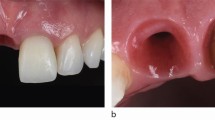Key Points
-
Highlights that detecting early complications can lead to more predictable treatment outcomes.
-
Aids an understanding that the patient can help with detecting disease.
-
Provides an understanding of what the patient can perceive and what they cannot in terms of detecting complications.
Abstract
Objectives This study investigated if the patient can have a role in reporting early peri-implant complications.
Design An exploratory, single-centred study comparing patient's perceptions of implant success to the clinical success at an examination.
Setting, materials and methods Seventy-five patients were randomly selected from patients who had received implant treatment at an implant referral practice. Phase 1 – Patient perception: Patients were asked to complete a questionnaire relating to the health of their implants. Phase 2 – Clinical examination: The patients were examined for implant health/disease.
Main outcome measures The responses from the patient perception questionnaires were correlated to the variables of the clinical examination. The null hypothesis 'Patients cannot perceive the difference between a successful implant and an implant that is suffering from complications' was then tested using Fisher's exact test.
Results All the variables tested statistically show a positive association between patient perception and clinical examination (p <0.001). All variables gave a significant result for Fisher's exact test. Therefore, the null hypothesis can be rejected.
Conclusions This study demonstrated that using validated questions an educated patient can perceive peri-implant health/disease. This can play a role in the early diagnosis of peri-implant complications.
Similar content being viewed by others
Log in or create a free account to read this content
Gain free access to this article, as well as selected content from this journal and more on nature.com
or
References
Albrektsson T, Zarb G, Worthington P, Eriksson A R . 1986. The long-term efficacy of currently used dental implants: a review and proposed criteria of success. Int J Oral Maxillofac Implants 1986; 1: 11–25.
Heasman P, Esmail Z, Barclay C . Peri-implant diseases. Dent Update 2010; 37: 511–512, 514–516.
Heitz-Mayfield L J . Diagnosis and management of peri-implant diseases. Aust Dent J 2008; 53: S43–S48.
Algraffee H, Borumandi F, Cascarini L . Peri-implantitis. Br J OralMaxillofac Surg 2012; 50: 689–694.
Zeza B, Pilloni A . Peri-implant mucositis treatments in humans: a systematic review. Ann Stomatol (Roma) 2012; 3: 83–89.
Serino G, Turri A, Lang N P . Probing at implants with peri-implantitis and its relation to clinical peri-implant bone loss. Clin Oral Implants Res 2013; 24: 91–95.
Heitz-Mayfield L J . Peri-implant diseases: diagnosis and risk indicators. J Clin Perio 2008; 35: 292–304.
Gilbert A D, Nuttall N M . Self-reporting of periodontal health status. Br Dent J 1999; 186: 241–244.
Pinelli C, de Castro Monteiro Loffredo L . Reproducibility and validity of self-perceived oral health conditions. Clin Oral Investig 2007; 11: 431–437.
McGrath C, Lam O, Lang N . An evidence-based review of patient-reported outcome measures in dental implant research among dentate subjects. J Clin Periodontol 2012; 39: 193–201.
Tomasi C, Derks J . Clinical research of peri-implant diseases quality of reporting, case definitions and methods to study incidence, prevalence and risk factors of peri-implant diseases. J Clin Periodontol 2012; 39: 207–223.
Graziani F, Figuero E, Herrera D . Systematic review of quality of reporting, outcome measurements and methods to study efficacy of preventive and therapeutic approaches to peri-implant diseases. J Clin Periodontol 2012; 39: 224–244.
Lang N P, Berglundh T, Working Group 4 of Seventh European Workshop on Periodontology. Periimplant diseases: where are we now? Consensus of the Seventh European Workshop on Periodontology. J Clin Periodontol 2011; 38: 178–181.
Author information
Authors and Affiliations
Corresponding author
Additional information
Refereed Paper
Rights and permissions
About this article
Cite this article
Wright, S., Archer, C. An exploratory study to investigate if patients are able to aid the early diagnosis of peri-implant complications. Br Dent J 218, 637–640 (2015). https://doi.org/10.1038/sj.bdj.2015.503
Accepted:
Published:
Issue date:
DOI: https://doi.org/10.1038/sj.bdj.2015.503



